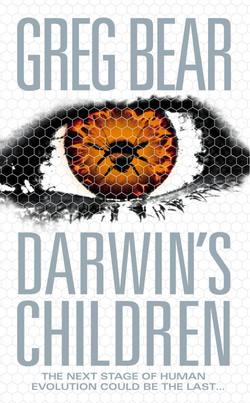Читать книгу Darwin’s Children - Greg Bear - Страница 9
CHAPTER FOUR Maryland
ОглавлениеMrs. Rhine stood in her living room, peering through the thick acrylic pane as if searching for the ghosts of another life. In her late thirties, she was of medium height, with stocky arms and legs but a thin torso, chin strong and pointed. She wore a bright yellow dress and a white blouse with a patchwork vest she had made herself. What they could see of her face between gauze bandages was red and puffy, and her left eye had swollen shut.
Her arms and legs were completely covered in Ace bandages. Mrs. Rhine’s body was trying to eliminate trillions of new viruses that could craftily claim they were part of her self, from her genome; but the viruses were not making her sick. Her own immune response was the principle cause of her torment.
Someone, Dicken could not remember who, had likened autoimmune disease to having one’s body run by House Republicans. A few years in Washington had eerily reinforced the aptness of this comparison.
“Christopher?” Mrs. Rhine called out hoarsely.
The lights in the inner station switched on with a click.
“It’s me,” Dicken answered, his voice sibilant within the hood.
Mrs. Rhine decorously sidestepped and curtsied, her dress swishing. Dicken saw that she had placed his flowers in a large blue vase, the same vase she had used the last time. “They’re beautiful,” she said. “White roses. My favorites. They still have some scent. Are you well?”
“I am. And you?”
“Itching is my life, Christopher,” she said. “I’m reading Jane Eyre. I think, when they come here to make the movie, down here deep in the Earth, as they will, don’t you know, that I will play Mr. Rochester’s first wife, poor thing.” Despite the swelling and the bandages, Mrs. Rhine’s smile was dazzling. “Would you call it typecasting?”
“You’re more the mousy, inherently lovely type who saves the rugged, half-crazed male from his darker self. You’re Jane.”
She pulled up a folding chair and sat. Her living room was normal enough, with a normal decor—couches, chairs, pictures on the walls, but no carpeting. Mrs. Rhine was allowed to make her own throw rugs. She also knitted and worked on a loom in another room, away from the windows. She was said to have woven a fairy-tale tapestry involving her husband and infant daughter, but she had never shown it to anyone.
“How long can you stay?” Mrs. Rhine asked.
“As long as you’ll put up with me,” Dicken said.
“About an hour,” Marian Freedman said.
“They gave me some very nice tea,” Mrs. Rhine said, her voice losing strength as she looked down at the floor. “It seems to help with my skin. Pity you can’t share it with me.”
“Did you get my package of DVDs?” Dicken asked.
“I did. I loved Suddenly, Last Summer,” Mrs. Rhine said, voice rising again. “Katharine Hepburn plays mad so well.”
Freedman gave him a dirty look through their hoods. “Are we on a theme here?”
“Hush, Marian,” Mrs. Rhine said. “I’m fine.”
“I know you are, Carla. You’re more sane than I am.”
“That is certainly true,” Mrs. Rhine said. “But then I don’t have to worry about me, do I? Honestly, Marian’s been good to me. I wish I had known her before. Actually, I wish she’d let me fix her hair.”
Freedman lifted an eyebrow, leaning in toward the window so Mrs. Rhine could see her expression. “Ha, ha,” she said.
“They really aren’t treating me too badly, and I’m passing all my psychological profiles.” Mrs. Rhine’s face dropped some of the overwrought, elfin look it assumed when she engaged in this kind of banter. “Enough about me. How are the children doing, Christopher?”
Dicken detected the slightest hitch in her voice.
“They’re doing okay,” Dicken said.
Her tone became brittle. “The ones who would have gone to school with my daughter, had she lived. Are they still kept in camps?”
“Mostly. Some are hiding out.”
“What about Kaye Lang?” Mrs. Rhine asked. “I’m especially interested in her and her daughter. I read about them in the magazines. I saw her on the Katie Janeway show. Is she still raising her daughter without the government’s help?”
“As far as I know,” Dicken said. “We haven’t kept in touch. She’s kind of gone underground.”
“You were good friends, I read in the magazines.”
“We were.”
“You shouldn’t lose touch with your friends,” Mrs. Rhine said.
“I agree,” Dicken said. Freedman listened patiently. She understood Mrs. Rhine with more than clinical thoroughness, and she also understood the two feminine poles of Christopher Dicken’s busy but lonely life: Mrs. Rhine, and Kaye Lang, who had first pinpointed and predicted the emergence of SHEVA. Both had touched him deeply.
“Any news on what they’re doing inside me, all those viruses?”
“We have a lot to learn,” Dicken said.
“You said some of the viruses carry messages. Are they whispering inside me? My pig viruses…are they still carrying pig messages?”
“I don’t know, Carla.”
Mrs. Rhine held out her dress and dropped down in her overstuffed chair, then brushed back her hair with one hand. “Please, Christopher. I killed my family. Understanding what happened is the one thing I need in this life. Tell me, even the little stuff, your guesses, your dreams…anything.”
Freedman nodded. “Good or bad, we tell her all we know,” she said. “It’s the least she deserves.”
In a halting voice, Dicken began to outline what had been learned since his last visit. The science was sharper, progress had been made. He left out the weapons research aspect and focused on the new children.
They were remarkable and in their own way, remarkably beautiful. And that made them a special problem to those they had been designed to replace.
